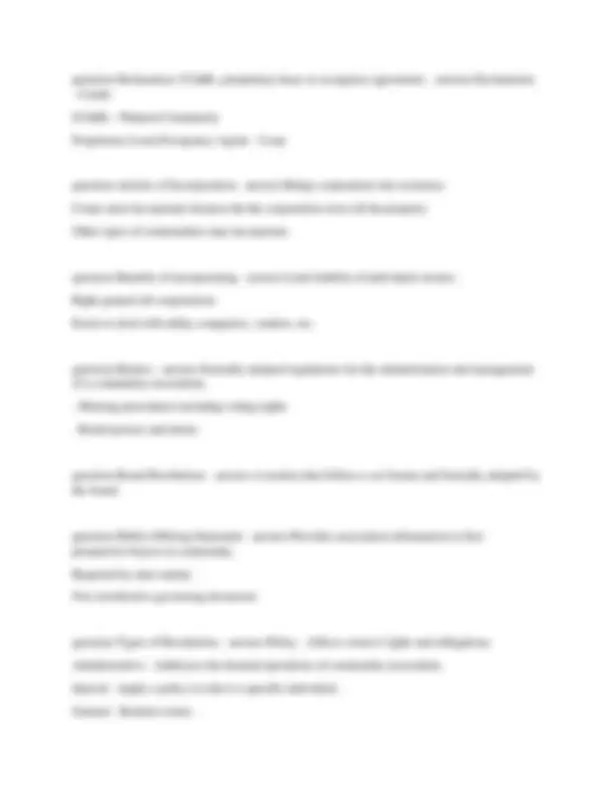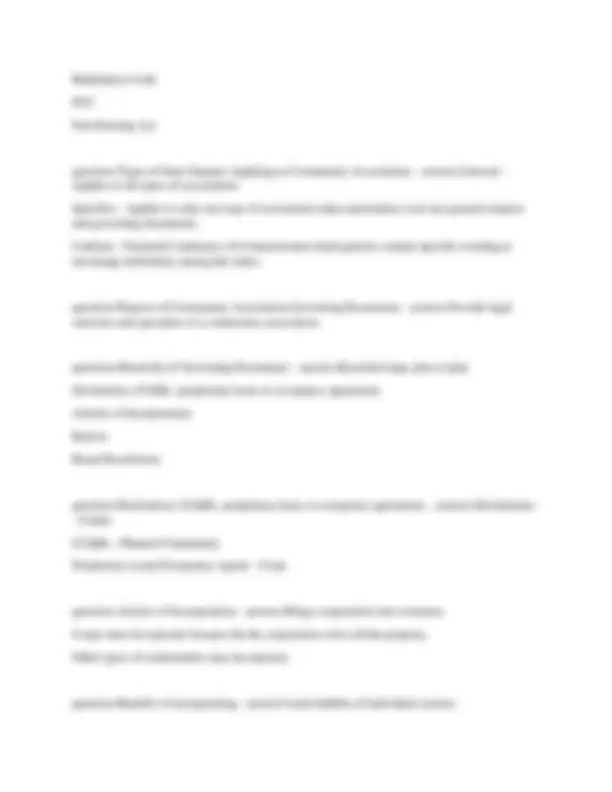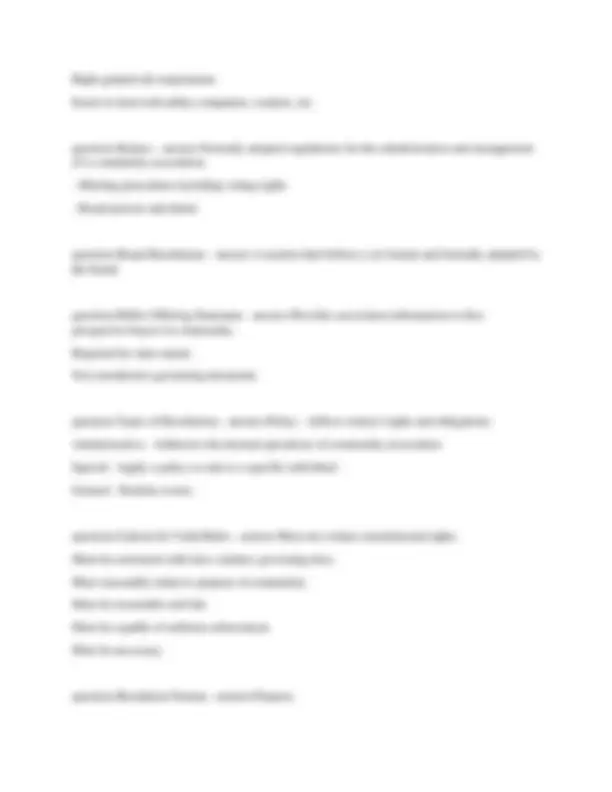














Study with the several resources on Docsity

Earn points by helping other students or get them with a premium plan


Prepare for your exams
Study with the several resources on Docsity

Earn points to download
Earn points by helping other students or get them with a premium plan
Community
Ask the community for help and clear up your study doubts
Discover the best universities in your country according to Docsity users
Free resources
Download our free guides on studying techniques, anxiety management strategies, and thesis advice from Docsity tutors
M100 COMMUNITY ASSOCIATION MANAGEMENT NEWEST EXAM WITH VERIFIED QUESTIONS AND CORRECT ANSWERS.pdf
Typology: Exams
1 / 20

This page cannot be seen from the preview
Don't miss anything!













question-Community associations can be grouped into clusters called: - answer-Master or Umbrella Associations - More than one residential community. Mixed-Use Development - Mixture of residential and commercial. "55 and Older" Communities - 80% of residents are 55+ and at least one per unit. question-Name the sources of legal obligations for a Community Association - answer-Federal, state and local statutes, regulations and case law. Governing documents Standards set by professional bodies (AICPA) Lender requirements question-Types of Federal Law Applying to Community Associations - answer-Equal Employment Opportunity Commission Fair Debt Collection Practices Act Fair Labor and Standards Act Family and Medical Leave Act FICA OSHA Bankruptcy Code FCC Fair Housing Act Characteristics of a Community Association - answer-Mandatory membership
Mutually binding documents Lien-based assessments question-Purposes of a Community Association - answer-Business - Not for profit Government - Runs like a mini-government Community - Mutual reasons for buying into area question-3 Basic Types of Community Associations - answer-Planned Community - Owners owns his lot/living unit and community owns common areas (tennis courts, basketball courts, etc.). Condominium - Individual owns unit and undivided interest (percentage) in common elements. Cooperative - Individual owns stock or membership in cooperative and holds a proprietary lease/occupancy agreement question-Types of State Statutes Applying to Community Associations - answer-General - Applies to all types of associations Specifics - Applies to only one type of association (takes precedence over any general statutes and governing documents. Uniform - National Conference of Commissioners draft generic content-specific wording to encourage uniformity among the states. question-Purpose of Community Association Governing Documents - answer-Provide legal structure and operation of a community association. question-Hierarchy of Governing Documents - answer-Recorded map, plat or plan Declaration, CC&Rs, proprietary lease or occupancy agreement. Articles of Incorporation Bylaws Board Resolutions
question-Criteria for Valid Rules - answer-Must not violate constitutional rights. Must be consistent with laws, statutes, governing docs. Must reasonably relate to purpose of community. Must be reasonable and fair. Must be capable of uniform enforcement. Must be necessary. question-Resolution Format - answer-Purpose Authority Scope & Intent Specifications question-Due Process Procedure - answer-A formal process to protect the rights of all parties. question-Alternative DIspute Resolution (ADR) - answer-3rd party resolution used before lawsuit/court question-Internal Resources for Enforcing Rules - answer-Suspension of voting rights Suspension of recreational facility usage Fines Eviction Self help question-External Resources for Enforcing Rules - answer-Local Health Department Local Zoning Department Local Fire Department Local Police Department Local Building Department
Local Animal Shelter question-Sources of Budget Requirements - answer-Federal Laws State Statutes Local Laws Governing Documents question-Name Two Main Budget Components - answer-Revenue & Expenses Revenue - Owner assessments, Interest, late fees, fines, usage fees. Expenses - Operating, major improvements, reserves question-Budget Line Items - answer-Mandatory & Discretionary Mandatory - Community and owner needs and obligations (maintenance, utilities, repairs, taxes). Discretionary - Owner, board and committee desires (social and recreational expenses, picnic areas, patrol, pool towels). question-Budgeting Methods - answer-Zero-Based - all line items are set to zero. Historical trend - Item assumed to be justified and prior information adjusted for planned changes. question-Reserve - answer-Funds set aside for future replacement of major components of communities common property. question-Extra-Judicial (nonjudicial) Remedies - answer-Late charge/interest penalty
question-Role of CPA - answer-Audit - Thorough examination of financials Review - Spot check Compilation - Slap docs on CPA letterhead (no check) question-Investments - answer-Purchase of anything with money value for the purpose of generating additional income over time. Safety - Protect the principal amount. Liquidity - Ease with which an investment can be converted to cash. Yield - Amount of return on investment. question-Five Types of Maintenance - answer-Routine Preventative Emergency Services Requested Reserve question-Maintenance Management Tools - answer-Checklists Charts of information Calendars or schedules Inventories Work orders Request forms question-Maintenance Responsibilities - answer-Governing docs State statutes Board resolutions question-Financial Protection - answer-Performance bond - Guarantee if contractor fails to perform or complete job.
Payment bond - Guarantee that contractors suppliers/subcontractors will be paid if contractor fails to pay them. Waiver of lien - Gives up the right to make a claim against the association. question-Exposure to Loss - answer-PLIP Property - buildings, land, inventory, supplies Liability - 3rd party claim of personal/property damage Income - Net loss (reduction in income/increase in OE) Personnel - claims of employee question-Risk Control - answer-Avoid Prevent Segregate Transfer question-4 Types of Insurance Coverage - answer-PLIP Personal Liability Income Personnel question-Property Exposures to Loss - answer-Commercial Package Policy (CPP) - Property and Liability. Mechanical Breakdown - Covers mechanical equipment. Ordinance/Law - Restores property to current codes Flood - Available through National Flood Insurance Program to cover rising waters Electronic Data Processing (EDP) - Covers electronic programs, networks, websites, security systems, etc.
question-What are the three basic types of Community Associations - answer-Planned Community Condominium Coopperative question-The National Conference of Commissioners on Uniform State Laws uses the term _______________ to refer to the most common type of community association. - answer- Planned Community question-In a planned community - answer-Owner owns his or her lot/living unit and the community owns any common areas such as tennis courts and roads for the use and benefit of the lot owners. question-In a condominium - answer-An individual owns his or her living unit and undivided interest in the common elements of the community. Each owner owns a percentage of the common elements....pool or lobby. The community association itself owns no real estate as an association. question-In a Cooperative - answer-An individual owns stock or membership. Holds a proprietary lease or occupancy agreement for his or her living unit. For most cooperatives, the community association owns all of the real estate as a not for profit corporation. There are some that are for profit entities. question-A proprietary lease or occupancy agreement - answer-defines the member of or stockholder's rights and obligations in relation to the living unit. question-What are the 3 other types of communities which can exist by themselves or can be grouped in clusters called. - answer-Master Umbrella association
Mixed Use Development 55 and older Communities question-Mixed - Use Developments - answer-Usually consists of a mixture of residential and commercial and or industrial uses grouped together... Their marketing slogan is often live, work, play. question-55 and older Communities - answer-Must have one person who is 55 years of age or older living in at least 80% of its occupied units. question-SSCRA - answer-Soldiers and Sailors Civil Relief Act of 1940 impacts American forces on active duty by requiring the delay of all civil court actions, such as bankruptcy and foreclosure, until the service member returns from active duty. question-FCC - answer-Stands for Federal Communications Commission. The Telecommunications Act of 1996. Rule concerning restriction on viewers ability to view programming from direct broadcast satellites, wireless cable and television broadcast stations. question-What statue takes precedence over any general statue that applies to the community association. - answer-A Specific state statue question-Do specific state statues take precedence over a community associations governing documents? - answer-Yes, unless it is written to all for flexibility. Characteristics of a Community Association - answer-Mandatory membership Mutually binding documents Lien-based assessments
Bankruptcy Code FCC Fair Housing Act question-Types of State Statutes Applying to Community Associations - answer-General - Applies to all types of associations Specifics - Applies to only one type of association (takes precedence over any general statutes and governing documents. Uniform - National Conference of Commissioners draft generic content-specific wording to encourage uniformity among the states. question-Purpose of Community Association Governing Documents - answer-Provide legal structure and operation of a community association. question-Hierarchy of Governing Documents - answer-Recorded map, plat or plan Declaration, CC&Rs, proprietary lease or occupancy agreement. Articles of Incorporation Bylaws Board Resolutions question-Declaration, CC&Rs, proprietary lease or occupancy agreement. - answer-Declarations
Right granted all corporations Easier to deal with utility companies, vendors, etc. question-Bylaws - answer-Formally adopted regulations for the administration and management of a community association.
Revenue - Owner assessments, Interest, late fees, fines, usage fees. Expenses - Operating, major improvements, reserves question-Budget Line Items - answer-Mandatory & Discretionary Mandatory - Community and owner needs and obligations (maintenance, utilities, repairs, taxes). Discretionary - Owner, board and committee desires (social and recreational expenses, picnic areas, patrol, pool towels). question-Budgeting Methods - answer-Zero-Based - all line items are set to zero. Historical trend - Item assumed to be justified and prior information adjusted for planned changes. question-Reserve - answer-Funds set aside for future replacement of major components of communities common property. question-Extra-Judicial (nonjudicial) Remedies - answer-Late charge/interest penalty Security deposit requirement Acceleration Owner rights suspension question-Judicial Remedies - answer-Record the association lien Foreclose the lien Personal money judgement question-Bankruptcy - answer-Chapter 7 - Liquidation
Chapter 11 - Corporate Chapter 13 - Personal reorganization question-Accounting Methods - answer-Cash Basis - Income received and expenses paid Accrual Basis - Income earned and expense received Modified Cash Basis - Records income (assessments) on accrual basis and expenses on cash basis question-3 components of Statement of Revenue and Expense - answer-Revenue - Earning of community Expense - Cost of goods/services used to operate/maintain community. Net revenue (or loss) question-Balance sheet - answer-Snapshot of financial condition at a specific point in time. Lists what the association owes and owns and its net worth. question-3 Major Components of a Balance Sheet - answer-Assets - Anything owned that has value. Liabilities - What is owed to others or collected in advance. Members equity - Difference between assets and liabilities. question-Role of CPA - answer-Audit - Thorough examination of financials Review - Spot check Compilation - Slap docs on CPA letterhead (no check) question-Investments - answer-Purchase of anything with money value for the purpose of generating additional income over time. Safety - Protect the principal amount. Liquidity - Ease with which an investment can be converted to cash. Yield - Amount of return on investment.
question-Risk Control - answer-Avoid Prevent Segregate Transfer question-4 Types of Insurance Coverage - answer-PLIP Personal Liability Income Personnel question-Property Exposures to Loss - answer-Commercial Package Policy (CPP) - Property and Liability. Mechanical Breakdown - Covers mechanical equipment. Ordinance/Law - Restores property to current codes Flood - Available through National Flood Insurance Program to cover rising waters Electronic Data Processing (EDP) - Covers electronic programs, networks, websites, security systems, etc. question-Liability Exposures to Loss - answer-Commercial General Liability (CGL) - Protects against claims arising from bodily injury. Hire and non-owned automobile liability - Covers claims when vehicles are not owned by association but are used during association business. Commercial umbrella - Extends insurance beyond limits of coverage. Directors & Officers (D&O) - designed to pay for damages arising from wrongful acts. question-Income Exposures to Loss - answer-Fidelity - Employee theft Assessments receivable - Loss of assessments due to damaged property Business - Loss of business income
Extra Expense - Ex. Temporary office, equipment, or help due to loss of office. question-Claims made - answer-Current insurance company covers your claim regardless if actual occurrence is from previous insurance carrier.